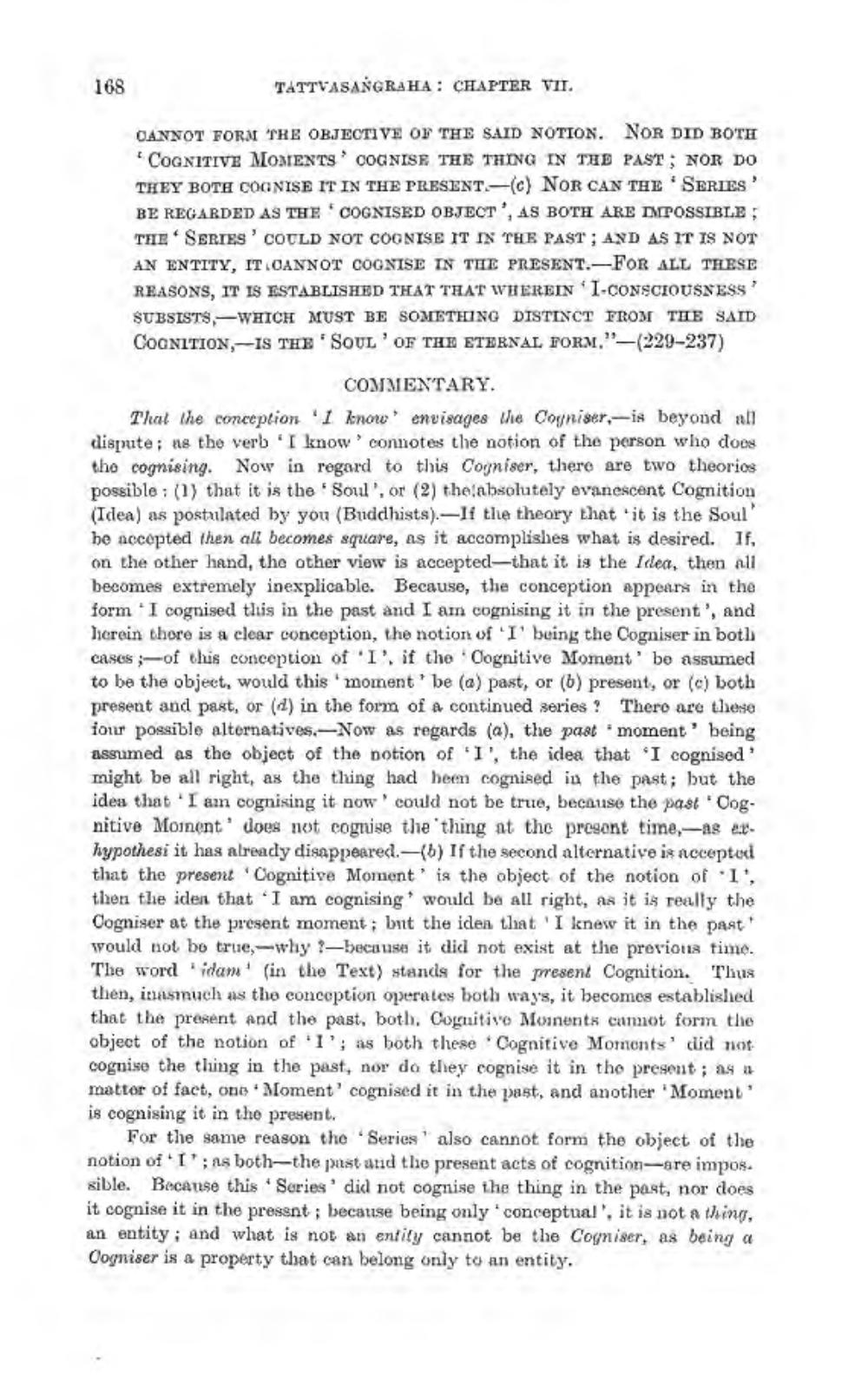________________
168
TATTVASANGRAHA: CHAPTER VII.
CANNOT FORM TRE OBJECTIVE OF THE SAID NOTION. NOR DID BOTH
COGNITIVE MOMENTS COGNISE THE THING IN THE PAST; NOR DO THEY BOTH COGNISE IT IN THE PRESENT.-(c) NOR CAN THE SERIES BE REGARDED AS THE COGNISED OBJECT, AS BOTH ARE IMPOSSIBLE THE SERIES' COULD NOT COONISE IT IN THE PAST ; AND AS IT IS NOT AN ENTITY, IT CANNOT COGNISE IN THE PRESENT.–FOR ALL THESE REASONS, IT IS ESTABLISHED THAT THAT WHEREIN I-CONSCIOUSNESS SUBSISTS, WHICH MUST BE SOMETHING DISTINCT FROM THE SAID COGNITION, IS THE SOUL' OF THE ETERNAL FORM."-(229-237)
COMMENTARY. That the conception 'I know envisages the Corniser,-is beyond all dispute; le the verb 'I know 'connotes the notion of the person who does the cognising. Now in regard to this Cogniser, there are two theorios possible : (1) that it is the 'Soul', or (2) the absolutely evanescent Cognition (Idea) as postulated by you (Buddhists).-If the theory that it is the Soul he accepted then all becomes Square, as it accomplishes what is desired. If, on the other hand, the other view is accepted-that it is the Idea, then all becomes extremely inexplicable. Because, the conception appears in the form I cognised this in the past and I am cognising it in the present', and Tierein thore is a clear conception, the notion of 'I' being the Cogniser in both cases of this conception of 'I'. if the Cognitive Moment' be assumed to be the object, would this moment' be (a) past, or (b) present, or (a) both present and past, or (4) in the form of a continued series! Thero are these iour possible alternatives.--Now as regards (a), the past moment' being assumed as the object of the notion of 'I', the idea that I cognised' might be all right, as the thing had been cognised in the past; but the idea that I am cognising it now could not be true, because the past Cog. nitive Moment' does not cognise the thing at the present time,-as er hypothesi it has already disappeared. (b) If the second alternative is accepted that the present Cognitive Moment is the object of the notion of l', then the iden that I am cognising would be all right, as it is really the Cogniser at the present moment; but the idea that 'I knew it in the past would not bo true; -why ?-because it did not exist at the previous time. The word idam in the Text) stands for the present Cognition. Thus then, inasmuch as the conception operates both ways, it becomes established that the present and the past, both, Cognitive Moinents cammot form the object of the notion of 'I'; as both these Cognitive Moments' did not cognise the thing in the past, nor do they cognise it in the present, as matter of fact, one Moment' cognised it in the past, and another Moment" is cognising it in the present.
For the same reason the Series' also cannot form the object of the notion of 'I'; as both-the past and the present acts of cognitionare impos. sible. Because this series did not cognise the thing in the past, nor does it cognise it in the present, because being only conceptual, it is not a thing, an entity; and what is not an entity cannot be the Cogniser, as being a Cogniser is a property that can belong only to an entity.




